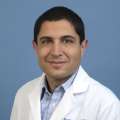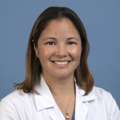Inflammatory Bowel Disease
Find your care
UCLA Health pediatric surgeons specialize in delivering outstanding surgical care to every child. Call to connect with an expert.
Expert care for pediatric Inflammatory Bowel Disease (IBD)
At UCLA Health, our pediatric surgery team offers expert care for children and teens diagnosed with ulcerative colitis (UC), Crohn's disease, and related conditions. We collaborate closely with the UCLA Pediatric Inflammatory Bowel Disease Program, a top team of experts who focus on treating kids with IBD. As active participants in the international Pediatric Inflammatory Bowel Disease Consortium, we help shape care standards and explore new treatment options through ongoing research.
Understanding pediatric IBD

IBD can be more severe in children than in adults, making specialized care essential for managing these complex cases. At UCLA, we understand the unique challenges of treating children with IBD, so we take a team approach to ensure every child gets personalized care.
Different types of IBD
- Ulcerative Colitis (UC): Affects the rectum and colon.
- Crohn’s Disease: Impacts the small intestine, colon, rectum, and anus.
- Indeterminate Colitis: Diagnosed when it’s unclear if the patient has UC or Crohn’s disease.
When is surgery needed?
Surgery might be an option for children and teens who don't respond to medical treatments, experience complications, have trouble gaining weight, or continue to have severe symptoms. Our surgical approach is carefully tailored to the specific type and extent of each child's IBD.
Surgical treatment for ulcerative colitis
If your child has UC and medical treatments aren't working, surgery might be the next step. The most common surgery is called a restorative proctocolectomy with an ileoanal J-pouch. This procedure was first created by UCLA pediatric surgeons back in the 1980s.
About J-pouch surgery
This surgery involves removing the entire colon and rectum and creating a J-pouch from the small intestine (ileum), which is then connected to the anus. The surgery may be performed in stages, especially for patients who are immunocompromised due to medications used to treat IBD. Staging the surgery allows for better healing and reduces the risk of complications.
The J-pouch helps patients have more normal bowel movements and maintain continence (bowel control), greatly improving their quality of life. At UCLA, our surgeons perform this procedure using laparoscopic techniques, which minimize scarring, improve wound healing, and lead to faster recovery—benefits that are especially important for patients with compromised immune systems.
Ideal candidates for J-pouch surgery
This procedure is ideal for children and adolescents with ulcerative colitis or familial adenomatous polyposis, a genetic condition that increases the risk of colon cancer. The surgery removes all diseased tissue while preserving the anal sphincter, avoiding the need for a permanent ileostomy, which was commonly required in the past.
Benefits of the surgery
- Complete Cure for Ulcerative Colitis: The surgery effectively cures ulcerative colitis.
- Reduced Cancer Risk: The procedure significantly lowers the risk of intestinal cancer in children with UC and intestinal polyposis syndromes.
- Improved Bowel Function: The J-pouch allows for more normal bowel movements and continence.
Post-surgery recovery
After surgery, patients typically stay in the hospital for 5 to 7 days and can expect 3 to 4 semi-solid or solid bowel movements per day.
Surgical treatment for Crohn's disease
Crohn's disease often affects multiple segments of the bowel. Therefore, our surgical approach focuses on preserving as much bowel as possible and is tailored to each patient’s specific needs.
Surgical options for Crohn's disease
Depending on the severity and location of the disease, as well as the child’s overall health, the following surgical treatments may be considered:
- Diagnostic laparoscopy
- Laparoscopic or open intestinal stricturoplasty
- Laparoscopic or open segmental resection
- Laparoscopic or open colectomy
- Temporary or permanent ileostomy
Our experts
Contact us
Appointments: (310) 206-2429
Fax: (310) 206-1120





